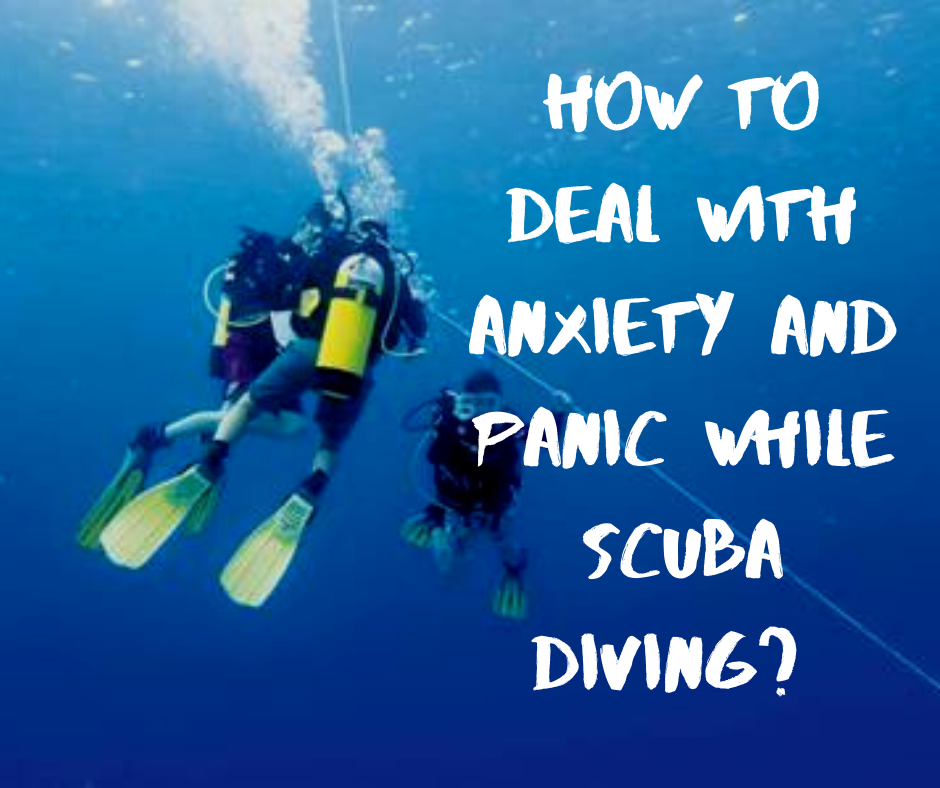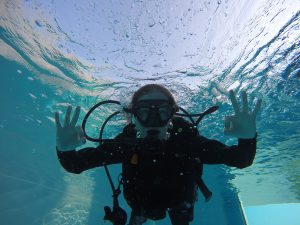
Most of the time divers are cool, calm and collected, enjoying the dive and taking in the underwater scenes. But when a diver panics underwater that cool calm demeanor is a thing from the past. Maybe you have seen a case of panic in a dive buddy — the wide-eyed look, the heavy breathing, the rapid ascend. If we are truly being honest, most of us have personally experienced at least a momentary spell of anxiety ourselves. Anxiety in scuba diving, or in everyday life, is a psychological state that can cause emotional and physical symptoms which can range from a quickened heartbeat to the paralyzing feelings of a panic attack. Kell Levendorf , dive accident investigator for Dive & Marine Consultants International in Florida says- “Recognizing the warning signs is the best method to proactively defuse a panic situation”.
Just as it is important to know how to respond in an underwater emergency, it is also crucial to be aware of anxiety underwater and how to react if you or your dive buddy experience it. RESCUE DIVER COURSE CAN PREPARE YOU TO DEAL WITH A PANICKED BUDDY. SIGN UP FOR THE ONLINE RESCUE DIVER COURSE TODAY
The following gives more information on the Prevention and Management of anxiety underwater:
Prevention
1.Good Emotional and Physical state
Being in a good emotional and psychological state is important as even a bit of bad news before the dive, an argument with the spouse, or something upsetting can have an emotional activation, increasing the likelihood that one’s response will be emotional in nature.
Good physical state is also important as poor nutrition, dehydration and fatigue can have a strain on our natural reactions.
Just because you can dive sometimes you should ask yourself- Should I dive?
Anxiety varies from person to person, from situation to situation, and even from day to day within the same individual- something that might not have been a problem a week before or ever can suddenly be a cause of major anxiety. So it is important to take care of your health.
2.Never Dive Beyond Your Skill Level
This may seem obvious to some, but not all dive shops operate to the same industry standards. For example, some shops may take you to a maximum depth that is beyond your training, strong current dives or prolong the ascent. These situations can be a huge source of anxiety for novice divers. Be aware of your skills and comfort level and ensure the dive center puts you on dive sites you are comfortable with.
3.Practice Your Skills
As we know panic is a sudden, uncontrollable surge of overwhelming anxiety and fear, often accompanied by wildly irrational thinking and behavior. When stress increases underwater, a diver’s ability to recognize and respond appropriately decreases in an emergency situation. It is critical for the diver to recognize the sign of stress before it reaches panic. As a preventative measure a solid understanding of safety procedures and the dive plan can ward of feelings of unease.
Having the appropriate training and skill set for the type of dive and depth you are doing is key in feeling comfortable and confident under water. If you feel nervous before entering the water or doing any specific skills, you may want to ensure you master them in shallow water or a pool first. For example, many divers feel uncomfortable flooding and clearing their mask or taking out their regulator during their Open Water Course. These are vital skills to master before doing an open water dive, so you can react without panic if this happens in an emergency situation.
4. Honest Communication
Being open and honest with your dive buddy and dive master or instructor about any concerns you might have is important. You should not feel ashamed to discuss your concerns. Voice any anxiety-provoking questions or scenarios that are on your mind, and the dive master or instructor will be aware of your concerns give advice or tips and check in with you more frequently throughout the dive.
5. Visualize Potential Problems and Solutions
Knowing which specific aspect of diving or of the dive makes you nervous is a great way to master your skills. Knowing what makes you anxious allows you to find a solution to the problem. For example if mask flooding makes you anxious you practice it in the shallow end of the pool where you might feel safer. If need environmental conditions makes you anxious you can do some research on the dive sites and area and talk to some locals. If the idea of seeing sharks makes you anxious read up on the local species found to clarify any misconceptions or false believes.
Being informed and prepared for how to react in situations that make you nervous before getting in the water can decrease the risk of panic during a dive and allow you to enjoy the experience.

Relax and have fun
Management
If the above preventative strategies don’t work and you find yourself feeling the signs of anxiety while underwater, you can try these management tools.
1. Positive Self Talk
If you feel anxious underwater, give yourself compassionate and kind thoughts. Remind yourself that you are safe and in control of the situation, your training prepared your for this. Tell yourself that you are strong and adventurous and you can do it. Notice your surroundings and remind yourself of how amazing it is to be underwater
2. Analyze What is Making You Anxious
Along with talking yourself through an anxious situation, you might want to analyze what is triggering your anxiety. Start from your head to your toes do a complete scan and note if you are holding any tension. Are you biting down on your regulator? Is your mask leaking? Are you breathing excessively? Did you see an unfamiliar marine species that may have triggered anxiety? Are you cold? Identifying the trigger is the easiest way to stop the anxiety in its tracks. When you have identified the trigger Stop– Breath– Think of a way to fix or eliminate the problem- Act.
3. Focus on Your Breathing
One of the most powerful things you can do while scuba diving is to control your breath. Not only is it important for buoyancy, but you can use it to stay calm. In your training you have heard this Mantra:
Stop– Breath– Think –Act.
Stop swimming for a moment.
Slow down your breathing and take deep, even breaths from your diaphragm.
Remember your training — such as what to do in an out-of-air emergency — and then Act.
For more info: Visit divepsych.com and download the free training exercises for diaphragmatic breathing, and controlling stress and panic.
Anxiety does not have to negatively impact your scuba diving. Though implementing the above prevention and management strategies, you may find that your dives are more calm, enjoyable and safe.
Written by-
Ri-Cristel Bezuidenhout PADI IDC Staff Instructor/ RAID Open Water Instructor

 WhatsApp us
WhatsApp us